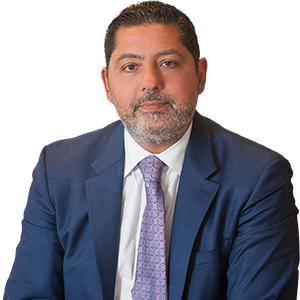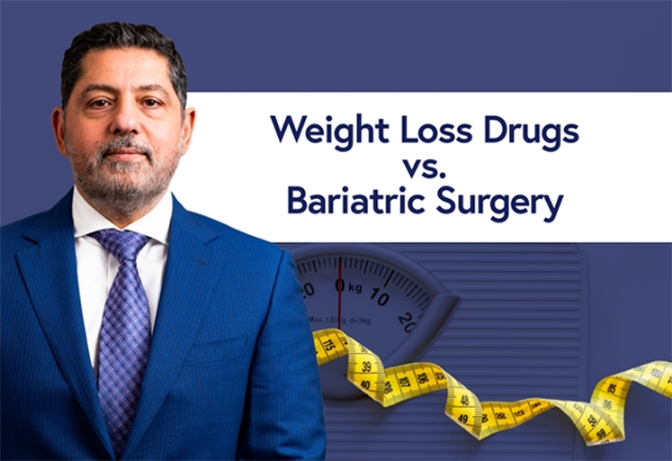Weight Loss Drugs vs. Bariatric Surgery – Which is Right For You?
If you’re trying to lose weight and finding it difficult, you may have considered taking medications or undergoing bariatric surgery. Both of these... read more
Call Us Today (732) 640-5316
E-Waiting RoomThe surgical team at Advanced Surgical & Bariatrics are pleased to be the first practice in New Jersey to have performed endoscopic sleeve gastroplasty. This procedure is a new and inventive non-surgical option for weight loss. The procedure utilizes endoscopic sutures to create a thin, sleeve-shaped stomach similar to the sleeve gastrectomy but without surgery and without cutting across or removing the stomach tissue.
The endoscopic sleeve gastroplasty is a new, minimally invasive non-surgical procedure. It is a weight loss procedure offered to patients who are not qualified candidates for bariatric surgery. The entire procedure is done through the mouth so there is no need for any incisions, and as a result, there is no scarring. The endoscopic sleeve procedure restricts the size of the stomach to significantly less volume than its original capacity. The main component of this procedure requires an endoscopic suturing device. The patient is first placed under general anesthesia. The doctor then places a scope down the throat of the patient and into the stomach. The sutures are inserted endoscopically in a specific pattern from the bottom of the stomach (antrum) to the top of the stomach (fundus). The end result of this suturing is the creation of a newly shaped “sleeve” within the patients’ stomach.
The non-invasive, non-surgical nature of this procedure allows for a pleasant post-procedure experience. Our patients generally spend two to three hours waking up in our recovery room before going home the same day. Generally, we recommend a soft liquid diet for a brief amount of time after the procedure, specific recommendations vary on a patient-by-patient basis. After the procedure patients can only consume a small amount of food and should be mindful of this. Overeating may cause discomfort. The endoscopic sleeve procedure is performed in conjunction with a diet and exercise plan that our nutritionist may customize with patients. Our team works closely to monitor the food intake and metabolic health before and after the procedure in order to ultimately create the most effective plan possible for our patients.
I love this practice. Seriously. I don't know how they did it, but even my memory of being strapped down to the operating table is a good one. On what should have been a scary morning getting ready for surgery, I just remember laughing with my doctors and feeling so confident and safe. My recovery was just as easy as they told me it would be. I love my VSG, I'm so happy to have found them and follow their recommendations. Would do it again in a heartbeat!!
Leah R.The endoscopic sleeve gastroplasty procedure is specifically designed for patients who are not morbidly obese, do not qualify for bariatric surgery, or who are unable to undergo bariatric surgery. This may include those with a body mass index of less than 40 with no comorbidities, those with a body mass index between 30 and 35, without serious comorbidities, or those who have large amounts of abdominal scarring from injuries or previous procedures.
Through the early trials of the endoscopic sleeve gastroplasty and published medical articles, the procedure has proven to yield great results for patients. A study published in the medical journal “Endoscopy” showed patients may expect to lose over 30% of their bodyweight within six months of the procedure and a drastic reduction in comorbidities. We have seen anywhere for 15-20% excess weight loss 3 months out from receiving the sleeve and 30-60% excess weight loss after six months. Comorbidity reduction has been seen in patients suffering from high blood pressure, diabetes, and sleep apnea.

Dr. Ragui Sadek is a premier surgeon who established a state-of-the-art and one of the safest bariatric surgery programs in the state. Dr. Sadek has fellowship training in both laparoscopic/bariatric surgery and surgical trauma/critical care, allowing him to safely perform complex surgeries on patients who have been turned down by other practices. As a Clinical Assistant Professor of surgery at RWJ Medical School & the Director of bariatric surgery program at RWJ University Hospital, Dr. Sadek offers a cutting-edge range of laparoscopic, robotic, & bariatric surgical procedures with a complication rate substantially below the national average.
Dr. Sadek is a Clinical Assistant Professor of Surgery at Rutgers-Robert Wood Johnson Medical School and a Fellow of the American College of Surgeons. Having performed more than three thousand advanced surgical procedures, Dr. Sadek has established a strong patient satisfaction rate and a solid reputation among the surgical community and is renowned as a top physician in his field by International Association of Healthcare Professionals. As a board-certified surgeon, he holds affiliations with the American Society of Metabolic and Bariatric Surgery and the Society of American Gastro Endoscopic Surgeons. More about Dr. Sadek
Stay current with Advanced Surgical & Bariatrics of New Jersey

If you’re trying to lose weight and finding it difficult, you may have considered taking medications or undergoing bariatric surgery. Both of these... read more

Are you frustrated with your inability to lose weight? Tired of being trapped in an endless cycle of yo-yo dieting, over-exercising, cleanses, and... read more